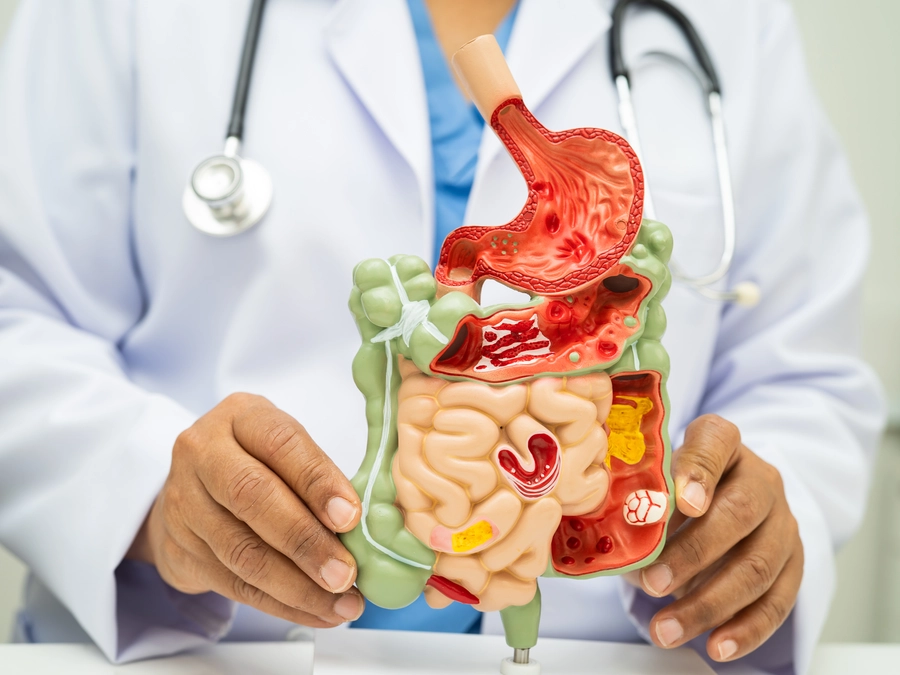Welcome



In today's health-conscious world, digestive wellness has become a central theme in discussions about holistic well-being. While many focus on diet trends and fitness routines, the hidden key to optimal gut function often lies in enzymes. These natural catalysts are responsible for breaking down food into usable nutrients, fueling energy, aiding tissue repair, and maintaining daily body functions. Yet, their importance is often underestimated. A lack of proper enzyme activity can lead to common digestive issues, including bloating, constipation, and nutrient deficiencies.
This article discusses enzymes and their roles in digestion and maintaining gut balance. From understanding their function to identifying deficiencies and boosting enzyme intake through foods or supplements, you'll gain actionable insights for building a stronger, healthier gut. Let’s begin the journey toward unlocking digestive health.
A healthy digestive system is not just about processing meals; it’s the backbone of overall vitality. Beyond breaking food into nutrients, the gut also influences immune strength, hormone balance, and energy levels. When working properly, the digestive tract extracts essential vitamins, minerals, proteins, and fats needed to sustain life. But when disrupted, the consequences extend beyond mild discomfort. Issues like irritable bowel syndrome (IBS), persistent heartburn, or nutrient malabsorption can quickly erode quality of life.
Supporting gut health requires more than eating fruits and vegetables. It’s about recognizing the complex web of factors—from diet quality and stress management to enzyme activity—that determine digestive efficiency. Enzymes are particularly crucial, acting as gatekeepers in the conversion of food into absorbable fuel. Without them, even the cleanest diet may fail to provide the nourishment your body craves.
In our fast-paced routines, reliance on processed meals, irregular sleep, and stress have become common, contributing to rising digestive challenges. By understanding enzymes and their role, we can make informed changes that not only soothe discomfort but also elevate energy and resilience.

They are essential proteins that help transform the food we eat into nutrients that are easily absorbed. They are released at different stages of the digestive tract — from the salivary glands in the mouth to the stomach, pancreas, and small intestine — with each type of enzyme designed to target a particular class of nutrients. Carbohydrates, proteins, and fats all rely on different enzymes to be reduced into smaller, absorbable components that fuel energy, tissue repair, and overall health.
Digestion begins orally, with salivary amylase initiating the conversion of starches into basic sugar forms. In the stomach, enzymes such as pepsin break down proteins into shorter peptide chains. By the time food enters the small intestine, pancreatic lipase acts on dietary fats, turning them into fatty acids and glycerol for absorption. These coordinated enzyme actions ensure that essential nutrients, including vitamins and minerals, are efficiently released from food and delivered to the body.
When the body fails to produce sufficient enzymes, food cannot be digested properly, resulting in bloating, indigestion, or nutrient deficiencies. Factors such as aging, prolonged stress, or certain health conditions may cause these insufficiencies. By understanding the different enzymes and their individual functions, it becomes easier to recognize when the body might need additional support. In such cases, dietary adjustments or supplementation with enzyme-based products can help restore balance and promote smoother digestion.
Enzymes are more than simple helpers—they are the engine of digestion. Acting as catalysts, they accelerate the transformation of food molecules into forms your body can utilize. Each stage of digestion relies on its specialized action.
When enzymes are lacking, incomplete digestion occurs. The result? Unabsorbed nutrients ferment in the gut, leading to bloating, cramps, and diarrhea. Long-term enzyme insufficiency can also lead to deficiencies in essential vitamins and minerals, ultimately impacting overall health.
Supporting enzyme function ensures efficient nutrient absorption, steady energy, and reduced digestive stress—showcasing why they’re indispensable to wellness.
Digestive enzymes fall into three primary categories, each with specific duties:
Knowing these categories makes it easier to detect deficiencies and choose targeted enzyme support.

When the body struggles to produce or activate enzymes, symptoms often show up as daily discomforts:
Beyond digestion, systemic issues such as skin flare-ups, chronic inflammation, and lowered immunity may also be linked to poor enzyme activity. Recognizing these signs early allows for timely intervention—through diet, supplements, or lifestyle changes—that can restore balance and vitality.
Adding enzyme-rich foods to your daily meals is one of the most effective ways to naturally support digestion. These foods not only deliver essential nutrients but also help the body process other foods more efficiently.
Pineapple is perhaps the best-known source of enzymes. It contains bromelain, a protease that helps break down proteins. Eating fresh pineapple or drinking unsweetened juice can provide your body with an extra boost when digesting protein-rich meals.
Papaya offers papain, another protease that aids in the digestion of proteins. This tropical fruit is particularly beneficial for individuals who experience heaviness or bloating after consuming protein-rich diets.
Fermented foods, such as sauerkraut, kimchi, yogurt, and kefir, are rich in both probiotics and enzymes. These living foods maintain enzyme activity during fermentation, offering a dual benefit: enhanced digestion and a healthier gut microbiome.
Other valuable options include:

By rotating these foods into your meals, you can naturally strengthen your digestive process, reduce discomfort, and increase nutrient absorption without resorting to supplements immediately.
While enzyme-rich foods, such as pineapple, papaya, and fermented products, are great natural sources, not everyone can rely solely on food for optimal digestion. Factors such as aging, stress, chronic digestive conditions, and poor dietary habits often impair the body's ability to produce sufficient enzymes. This is where Digestive enzyme supplements come in.
They provide concentrated forms of amylase, protease, lipase, lactase, and other enzymes that can significantly enhance the way your body breaks down food.
One of the most noticeable benefits of enzyme supplementation is relief from uncomfortable digestive issues. Conditions like bloating, gas, and indigestion often stem from incomplete food breakdown in the gut.
By supplying the enzymes your digestive system lacks, supplements help food break down more efficiently, which reduces fermentation in the intestines — the root cause of much discomfort. Many people notice that after taking Digestive enzymes with meals, they experience a lighter, more comfortable feeling post-digestion.
Good digestion isn’t just about avoiding discomfort; it’s also about getting the most out of your meals. If the body can’t fully break down proteins, carbohydrates, and fats, valuable vitamins and minerals remain locked away.
Enzyme supplements aid in releasing nutrients for absorption, with proteases breaking down proteins into amino acids and lipases facilitating the utilization of fatty acids. Over time, improved absorption can contribute to stronger immunity, better skin health, and more balanced energy levels.
Food intolerances are a growing issue, with lactose intolerance being one of the most common. For individuals who are lactose intolerant, taking a lactase enzyme supplement allows them to enjoy milk, cheese, or ice cream without discomfort.
Similarly, other specialized enzymes, such as alpha-galactosidase (often found in "anti-gas" supplements), can help reduce bloating when consuming beans and cruciferous vegetables. This targeted support can make a significant difference in quality of life, especially for individuals who feel limited in their food choices.
When digestion is sluggish, the body spends significant energy trying to compensate for poor absorption, often leaving you tired and sluggish after meals. Enzyme supplementation eases this burden.
By helping food break down quickly and completely, enzymes free up energy that your body can redirect toward daily tasks, workouts, and even mental focus. Over time, this leads to improved vitality, better mood, and enhanced productivity.
For individuals with chronic illnesses, age-related enzyme decline, or those recovering from digestive surgeries, enzyme supplementation can be a game-changer. As we age, natural enzyme production tends to decline, contributing to issues such as acid reflux, constipation, or malnutrition.
In such cases, supplementation helps bridge the gap and restore digestive balance. People with conditions such as pancreatitis, IBS, or celiac disease may also benefit greatly from enzyme support. However, it's recommended to consult a professional first.
With countless Digestive enzyme supplements on the market, it’s easy to feel overwhelmed when trying to make the right choice. Each product comes with its own formula, dosage, and promises, but not all are created equal.

Picking the right supplement is about more than grabbing a bottle from the shelf — it requires knowing what your body needs and understanding how different enzymes work. Below are some key guidelines that can help you navigate this process and make an informed decision.
Look for a Broad-Spectrum Formula
A strong starting point is to choose a broad-spectrum enzyme supplement. This means the product contains a combination of enzymes that target carbohydrates, proteins, and fats — the three major macronutrients in your diet.
Having these three core enzymes ensures you receive well-rounded support for your everyday meals. Without them, you may only address part of the digestive process, which could still leave you with bloating, discomfort, or incomplete nutrient absorption. Some advanced blends also include enzymes for fiber (cellulase) and sugars (maltase, sucrase), which can provide additional benefits for people with more complex digestive challenges.
While a broad-spectrum product works well for general use, some people benefit from specialized enzyme blends. The key is to match the formula with your particular digestive concerns:
By tailoring your choice to your needs, you not only improve digestion but also make eating a more enjoyable experience.
Not all enzymes are derived from the same sources, which can impact both their effectiveness and dietary compatibility.
For many people, plant-based and microbial options are preferable because of their consistency, stability, and ethical compatibility.
When it comes to optimizing digestive health, Revolution Nutrition offers more than just generic supplements — several of our products are specifically formulated to support digestion, reduce bloating, and help your body absorb nutrients more efficiently. Below are some of our standout items that align well with the enzyme-power and gut health theme of this article.
By including Digestive enzymes in our formulas, Revolution Nutrition ensures that when you use our protein supplements, you’re getting more than protein — you're getting assistance for your own enzyme system. For example:

Beyond food and supplements, everyday habits play a huge role in digestive wellness. Implementing small but consistent lifestyle changes can dramatically improve gut efficiency.
Together, these lifestyle habits complement enzyme activity, creating a holistic approach to digestive care.
Digestive enzymes may be invisible to the eye, but their impact on health is undeniable. They act as the unsung heroes of digestion, transforming complex foods into essential nutrients that sustain life. Without them, even a nutrient-rich diet could leave the body undernourished and fatigued.
By learning the signs of enzyme deficiencies and incorporating enzyme-rich foods, high-quality supplements, and supportive lifestyle habits, anyone can unlock the path to improved digestion. The result? Improved nutrient absorption, fewer digestive discomforts, stronger immunity, and overall vitality.
Digestive health isn’t just about what you eat—it’s about how well your body can use it. Enzymes make that possible. By embracing their power, you’re not only investing in a healthier gut but also in long-term well-being and quality of life.
Your journey toward digestive wellness begins with awareness and small, proactive steps. Harness the natural power of enzymes, and you’ll be well on your way to a vibrant, balanced gut.